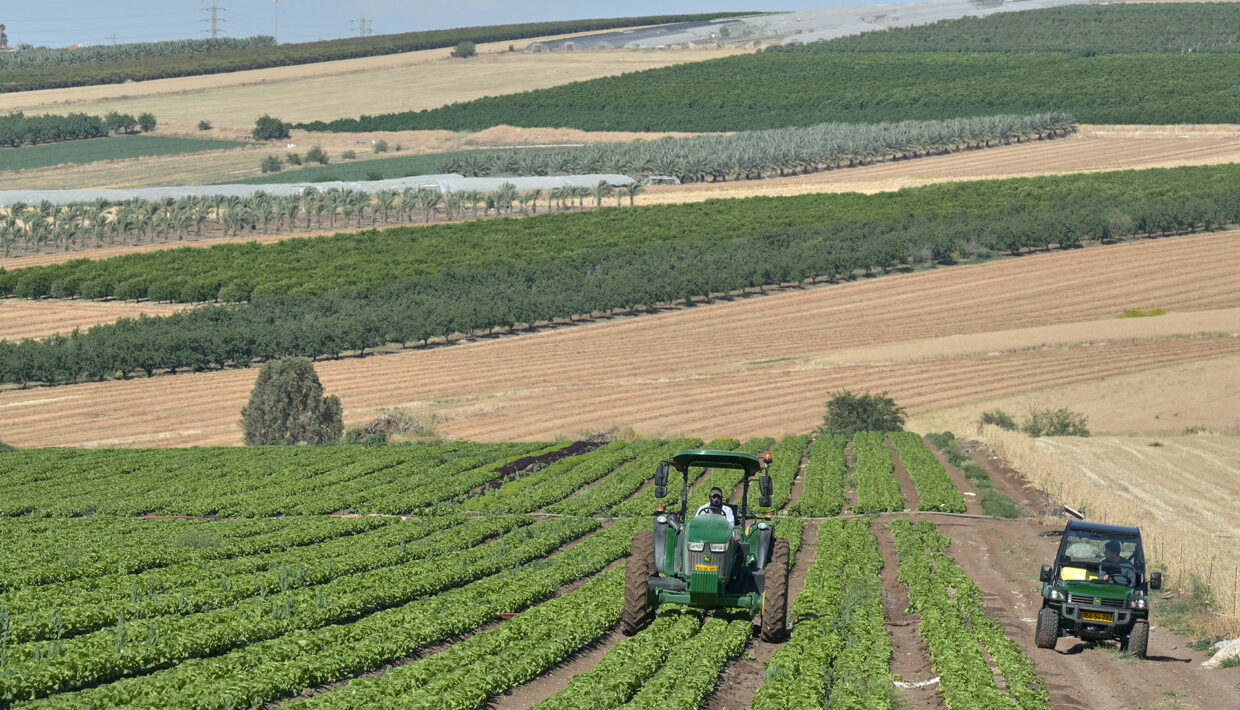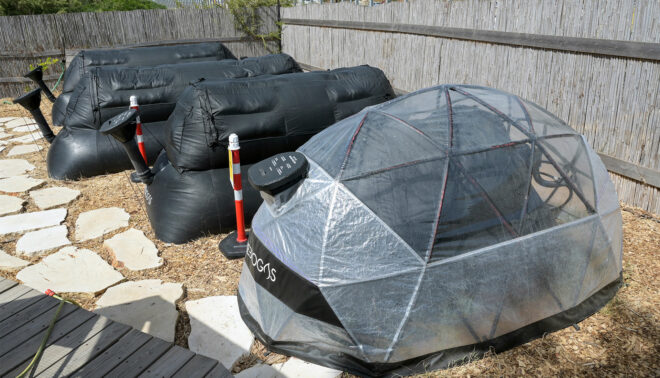Negev desert? Sure, it exists. But on the outskirts, it may have been a desert in the past. Today, it is cleverly used agricultural land, although it is in a semi-arid zone. “We only get 350 millimetres of precipitation here each year,” says Mario Polacco Rami, standing in one of the barley fields being harvested on this day in early May, with an outside temperature above 25 degrees Celsius. Here in the more northern part of the Negev, near the city of Ofakim, the 69-year-old keeps a close eye on the harvest across vast and hilly terrain. Two combines are in use, and in one smooth step, straw is pressed into square bales weighing around 350kg each.
Sewage sludge for soil improvement
Rami is responsible for a cultivation area of around 4,000ha , which are farmed in a joint venture by the three kibbutzim Ruchama, Dorot and Tselim.
Half of it is irrigated. The crop rotation is classical: Wheat twice, then barley, finally followed by peas. Treated sewage sludge from not-so-distant Jerusalem adds a bit of organic matter to the humus-deficient soil. “Lousy soil,” as Rami puts it. Walking briskly, he approaches a square bale. “This is actually the most valuable component of our harvest,” says the man with the distinctive floppy hat as he reaches into the bale of straw. “That’s because roughly 60 percent of our harvest revenue comes from the straw. For one bale, we receive 300 to 400 shekels (€81 to €108),” he adds.

Mario Polacco Rami is responsible for a cultivation area of around 4,000ha.
Overall Rami is very pleased with the process of baling right after threshing. “We reduce the labour requirement and have more straw, higher quality, no residues between the stubble and, to top we collect the seeds of the weeds,” he explains. The clean stubble field that provides ideal conditions for reduced tillage practices, which he firmly believes will be implemented in the future via autonomous driving.
Farmer Rami, by no means a digital native, was always open to new ideas. With this mentality, his generation transformed parts of the Israelian desert into farmland. The key to success clearly lies – in addition to all other important technical and agronomic innovations – in irrigation and the use of water, a scarce and valuable resource. Yet the demand is already overwhelming, and still increasing. This is the case at the Tzabar-Kama farm in Mort Kiriat Malachi, which is run by 60-year-old Eyal Muchan and his 30 employees, plus another 400 seasonal workers.

Eyal Muchan stores 12 million cubic meters of treated water in 8 artificial lakes.
Irrigation with wastewater
“We are the largest farm with irrigation systems in Israel,” Muchan tells us as we head to one of eight large water reservoirs, where twelve million cubic meters of treated wastewater from the Jerusalem metropolitan area are collected and delivered as needed to the slender drip irrigation system with a diameter of only 20 millimetres, primarily for cotton, but also for chickpeas and wheat. The wastewater treatment plant is located about ten kilometres from the metropolis of Jerusalem; the wastewater flows downhill without any pumps to the catch basins across an elevation change of about 700 meters. The plan is to build a floating photovoltaic system on the basin in the future.
“We can only achieve our excellent harvests with substantial amounts of water,” Muchan explains, underscoring the central importance of irrigation. In good years, Tzabar-Kama farmers harvest 35dt of sunflowers, 70dt of wheat, and 6.5dt of cotton per hectare. In addition to sunflowers, wheat, melons, cotton, and chickpeas, the farm also produces wine, bananas, jojoba, pomegranates, almonds, and olives. There is also a 14ha avocado plantation completely covered by a photovoltaic structure, in which the company invested 60 million shekels (17.052 million €). “Our wide range of crops not only makes us more stable in the face of fluctuating prices, but also helps us better compensate for catastrophic failures of individual crops, as was the case with almonds last year,” Muchan says, explaining the company’s product strategy.
We can only achieve our excellent harvests with substantial amounts of water.
Eyal Muchan
In addition, hemp has been cultivated in a strictly sealed green house for several years, a substance which is produced as a dietary supplement with cannabidiol (CBD) for a growing market. “As energy prices increase, we will have to further optimize our workflows and continue to make use of all the technical possibilities at our disposal in the future,” Muchan states. But what he finds most important of all, he says, is “finding good employees and, above all, young people who have a solid education and are committed to joining us.” Cultivating the next generation of farmers is also a challenge in Israel because many young people still choose to leave rural areas to move to the city, where they are lost to the IT industry, among others.
The beginnings
A phenomenon that could not have been foreseen back in the days of Yitzhak Elazari Volcani, who came to Palestine from Latvia in 1908 and established an agricultural research station there; it later grew into today’s Agricultural Research Organization, located at the Volcani Center, south of Tel-Aviv. Volcani saw to the reclamation of the desert and the cultivation of mixed crops. Israelian agriculture, and ultimately the whole society, continues to benefit from that incredibly difficult pioneering work to this day; as a result, the country has managed to achieve a high degree of self-sufficiency with just over 5,000 farms. However, as the Israelian population continues to increase, so do the challenges – especially due to climate change.
Scientists like Dr. Shmuel Assouline (Associate Director for International Relations at the Volcani Institute), who moved from Morocco to Israel when he was only 16 years old, never cease developing new concepts to increase efficiency and yields so that the country can be prepared for the future. A key factor is water, which is also provided thanks to a steady increase in the capacity of desalination plants. Israelian desalination plants currently generate an output of 550 million cubic meters annually; by the end of the decade, the volume is estimated to increase to 750 million cubic meters. This requires a lot of energy, which should be generated through a massive expansion of solar energy.
Water is expensive; wasting it is a crime.
Dr. Alon Ben-Gal
A cubic meter of desalinated water currently costs about 50 cents, Dr. Alon Ben-Gal works out. He is an employee of the Volcani Research Center in Gilat, which conducts research on agriculture under arid and semi-arid conditions. The relationship of water to CO2 and the nitrogen cycle are being studied, in addition to all aspects of supplying water to crops cultivated under desert-like conditions.
The lively researcher, who grew up in the USA in the northern state of Illinois, drives out to his test fields, navigating his way down bumpy dirt roads. One of his test fields is equipped with a pivot irrigation system. “The technology is there, no doubt about it, along with the data collected by various sensors, satellites and other systems, like drones and thermal imaging. The real problem is finding out how farmers can ultimately make quick and precise decisions with this wealth of data,” says Ben-Gal, as he introduces his main research objective. “I want to design an evaluation system for the geo-data that will allow precise irrigation that can immediately be adjusted according to the situation and requirements,” says the busy researcher. His credo: Water is expensive; wasting it is crime.

Drip irrigation system for vegetable growing.
Water management
The provenience of water used for agriculture is quite varied in Israel: In addition to urban wastewater and desalinated seawater, water collected during heavy rains as well as saline groundwater and well water also play their part in the “miracle of Israeli agriculture,” as Amos Peleg puts it, former CEO at the Israelian John Deere dealership Mifram Agencies Ltd. Everywhere, from the Negev in the south to the Golan Heights and the Lebanese border in the north, you can see elaborate irrigation technology, pumping stations, countless reels with hoses and small and large basins. Here, everything related to water is strictly governed by the Israeli Ministry of Agriculture, under whose leadership a water supply authority operates; this, in turn, is carefully supervised by a regulatory authority. In other words: Both policy makers and the general public monitor exactly how, where, and how much water is being used. Because of this, misuse is almost inconceivable. What happens instead is that research pursuits receive a great deal of attention, asking questions such as whether tomatoes are best harvested dried right on the vine. Now, wouldn’t that be another clever approach to conserving water in short supply?
Not far from the Jordan River, the narrow border river with Jordan, Gelad Bechor is responsible for a 50-hectare vegetable and fruit farm near one of the oldest villages, which was founded by Zionists around 1900. You can find limes and mangos in the orchards, and watermelon, spinach, oregano and thyme planted in the fields.
Unlike other areas, this northeastern region has a comparatively high annual precipitation of up to 450 millimeters. Nevertheless, it cannot thrive without sophisticated drip irrigation. For this reason, there is a sensitivity to the most precious commodity here just as there is everywhere in Israel.
New ideas for coping with scarcity
In this regard, an awareness of the scarcity of water appears to be beneficial for the whole spectrum of agricultural activities, as evidenced by new and promising ideas. For example, an Israeli company called Home Biogas has developed simple yet popular micro-biogas systems that are increasingly in demand in many African countries. For the simple reason that the methane from the small mini biogas-producing systems can be used in lieu of firewood from rare groves for cooking. This is a real and sustainable made-in-Israel alternative, particularly for the rural regions that still lack a grid connection.
And then there are daring entrepreneurs like Drar Tamir, founder of Hargol, a company trying to produce “biblical nourishment” on unoccupied poultry farms: Locusts. Yes, locusts: not as a plague, but as insects with an incredibly high protein content of 72 percent relative to their total body weight. Seeing locusts on your plate certainly takes some getting used to. Though people may raise their eyebrows at the idea today, locusts could be considered a snack and valuable source of protein in the world of tomorrow, especially in the face of the daunting challenges the world faces. Either way, Israeli agriculture is thriving despite scarcity and a permanent state of emergency, which is driving many in the Israeli agricultural world to come up with extraordinary ideas and ways of using the land. Including several surprises!





